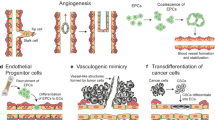Abstract
Hepatocyte growth factor/scatter factor (HGF/SF) stimulates cell proliferation, motility and invasiveness via its receptor c-Met during embryogenesis and repair processes. It induces angiogenesis, promoting endothelial cell migration and capillary-tube formation in vivo. Co-expression of HGF/SF and c-Met receptor results in enhanced tumour growth, invasiveness and a mesenchymal-epithelial transition in some experimental tumours. Since mesothelioma cells have been reported to express c-Met receptor and to migrate in response to HGF/SF, we investigated human malignant pleural mesotheliomas for the demonstration of possible co-expression of the growth factor and its receptor. The microvessel density of the tumours was also analysed in order to assess the influence of HGF/SF expression on tumour angiogenesis. Thirty-nine paraffin-embedded specimens of malignant pleural mesotheliomas were immunostained by anti-HGF/SF and anti-c-Met antibodies and semiquantitatively evaluated. c-Met mRNA expression was visualised in ten tumour samples by a fluorescent in situ hybridisation method. Microvessel density was calculated by counting microvessels with a high-power field (200×) on von-Willebrand-factor-stained slides. We found an increased production of HGF/SF in 33/39 tumours and a corresponding overexpression of c-Met receptor in 29/39 specimens. The FISH method detected increased transcription of c-Met mRNA in malignant cells and in neighbouring vascular endothelial cells. HGF/SF-positive mesotheliomas had significantly higher microvessel densities compared to their HGF/SF-negative counterparts. The observed co-expression of HGF/SF and c-Met in malignant pleural mesotheliomas suggests a possible self-stimulation (autocrine loop) of tumour cells. On the basis of the significantly higher microvessel density values of malignant mesotheliomas overexpressing HGF/SF, we postulate, that HGF/SF may be an additional relevant factor in tumour angiogenesis in malignant pleural mesotheliomas.
Similar content being viewed by others
Author information
Authors and Affiliations
Additional information
Received: 8 January 1998 / Accepted: 11 February 1998
Rights and permissions
About this article
Cite this article
Tolnay, E., Kuhnen, C., Wiethege, T. et al. Hepatocyte growth factor/scatter factor and its receptor c-Met are overexpressed and associated with an increased microvessel density in malignant pleural mesothelioma. J Cancer Res Clin Oncol 124, 291–296 (1998). https://doi.org/10.1007/s004320050171
Issue Date:
DOI: https://doi.org/10.1007/s004320050171




